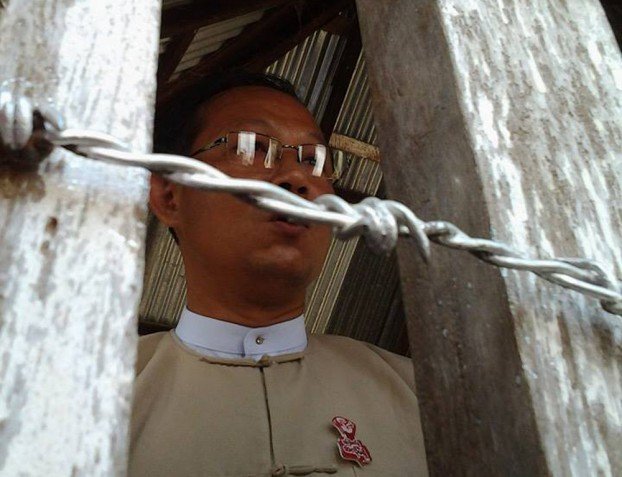The writer and former National League for Democracy (NLD) member Htin Linn Oo has been sentenced to two years in prison with hard labour on defamation charges by a court in Magwe Division.
Htin Linn Oo had been on trial for eight months under Penal Code charges articles 295(a) for defaming religion and 298 for hurting religious feelings after he strongly criticised the nationalist policies of the Buddhist monk-led group Ma-Ba-Tha, officially known as the Association for Protection of Race and Religion, during a public literature talk in Magwe’s Chaung-U in October last year.
Htin Lin Oo’s brother Nay Oo told DVB that the Chaung-U Township court on 2 June had been found guilty of one charge and acquitted of another.
“The court gave him the maximum sentence under Article 295(a) – two years in prison with hard labour – and decided to acquit him of the Article 298 charge,” said Nay Oo.
Defence laywer Thein Than Oo criticised the ruling as unfair, and claimed that the decision had been influenced by pressure from the Ma-Ba-Tha, members of which gathered outside of the court at the hearing of the verdict.
“We believe that Htin Linn Oo is innocent, and that he was practicing his right to free speech as provided by the 2008 Constitution and the Universal Declaration of Human Rights. He was accused under charges of intentionally insulting religion, but there was no evidence for that,” said Thein Than Oo.
“We think the court’s decision was due to external pressure; a lot of Ma-Ba-Tha members showed up at the courthouse, and since the beginning of the trial they have been forming a mob outside of the building, chanting slogans and threats. We assume the court passed the maximum sentence in fear of an angry response from the Ma-Ba-Tha if the verdict was light,” said the lawyer.
In January Htin Linn Oo gave a formal apology to a collection of local Buddhist monks, who publically granted him forgiveness.
[related]
“There was no member of the monastic community testifying against Htin Linn Oo in the trial – instead the revered Myawaddy Sayadaw testified in his defence. From that, we can see that the monastic community was not really upset by his remarks, but only the Ma-Ba-Tha,” said Nay Oo.
In the controversial speech made on 23 October 2014 in Chaung-U, Htin Lin Oo said: “They [the Ma-Ba-Tha] claim to teach the dharma but they do vile things – they yell and shout, and preach lies and prejudice to the people – and I am absolutely disgusted by them!”
“One thing for sure is that the Lord Buddha was not Burmese, or Shan or Kachin or Karen or Chin or Arakanese – he wasn’t from one of the ethnicities of Burma. Brothers and sisters, are you aware of this? If you really love your race, then don’t follow his religion. He is not of our race,” he said.
Following the furore caused by his speech, Htin Linn Oo was removed from his post as NLD information officer.
He appeared in over 20 court hearings since the trial at began eight months ago. He was sent to Monywa prison following the verdict.
Rights groups have condemned Tuesday’s ruling and highlighted the message of tolerance at the heart of Htin Lin Os’s speech.
Amnesty International’s Rupert Abbott, research director for Southeast Asia and the Pacific, said: “Today’s verdict is yet another blow to freedom of expression in Myanmar [Burma] and should be overturned immediately. Htin Lin Oo did nothing but give a speech promoting religious tolerance – we consider him to be a prisoner of conscience who should be released without conditions.”
“This is a sad indication of how Myanmar continues to rely on a range of draconian laws to silence and lock up critical voices. Despite promises to clear the country’s jails of prisoners of conscience, arrests of peaceful activists have actually picked up pace alarmingly over the past two years,” Abbott added.
Burma Campaign UK (BCUK) have called on the British government to pressure Burma to halt its stifling of free speech.
BCUK campaigns officer Wai Hnin said, “The Burmese government should be encouraging writers like Htin Lin Oo to promote interfaith tolerance in the country, rather than sending him to jail.”
“The jailing of Htin Lin Oo is an example that people in Burma still get arrested for exercising their freedom of speech. It is time for the British government to step up public and private pressure to make sure that Htin Lin Oo and all remaining political prisoners are released immediately,” he said.



